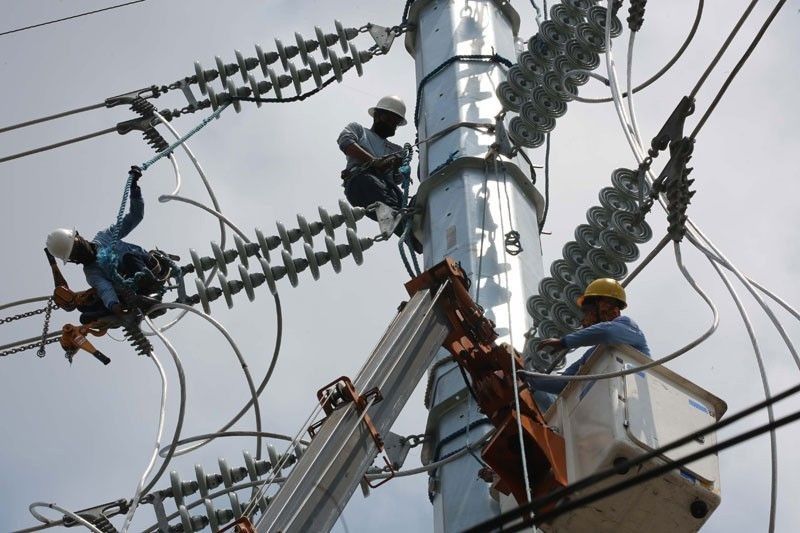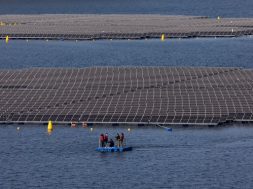
ERC Identifies Erring Power Generation Firms
MANILA, Philippines : The Energy Regulatory Commission (ERC) has identified the generation companies (gencos) that did not report plant outages or identify their facilities needing immediate technical inspection as part of measures to address the perennial problem of power shortage during summer.
In a statement yesterday, the ERC said it has identified gencos that were not compliant with the reporting requirements, especially concerning problems in their generating facilities. The gencos were not named.
Out of the 2,083 incidents of unplanned outages between January and April, more than half or 1,288 cases were reported. For the 236 planned outage incidents, 220 were reported.
In a statement yesterday, the ERC said it has identified gencos that were not compliant with the reporting requirements, especially concerning problems in their generating facilities. The gencos were not named.
The ERC said it would be issuing show cause orders to the concerned gencos.
The power regulator has directed erring gencos to explain the apparent breach in the maximum allowable unplanned outage days per year.
Meanwhile, an ERC-organized task force has already identified the generation plants that would be prioritized in the conduct of technical inspection to verify the outages as well as actions undertaken by the power plants to get back online.
The task force was created in April to conduct a study on the power plant outages and resulting high prices in the wholesale electricity spot market (WESM).
“We have been monitoring the activities of the generation companies, especially those that underwent unplanned outages, that caused the thinning of power supply in the Luzon grid.
This was aggravated by the increased demand for electricity due to warmer temperatures. As a consequence, there has been sustained high prices in the WESM,” ERC chair Agnes Devanadera said.
“The power supply shortage during the summer months has been a perennial problem and the regulator has been monitoring the situation from day one,” she said.
“There are existing rules and mechanisms in place on how to mitigate the impact to consumers. Thus, the stakeholders must be responsible in managing their operations efficiently and sensitive enough of the implications of planned or unplanned outages,” she added.
“The Commission has been undertaking all the necessary efforts to help mitigate, if not totally address, this recurring challenge.”
‘Quick-to-deploy’ plants
Amid the specter of long blackouts, the Manila-based Institute for Climate and Sustainable Cities (ICSC) said regulators should help speed up approval of quick-to-deploy power plants in preparation for next year’s dry season.
The power shortage is seen to get worse next year as the economy begins to reopen with the vaccination of a large number of Filipinos, said ICSC.
“It might even be worse. We expect the economy to get better next year. We are vaccinating our people so there will be higher demand. Moreover, many of these coal plants are already ageing,” ICSC senior policy advisor and former National Renewable Energy Board (NREB) chairman Pedro Maniego Jr. said at a briefing.
Last week, the Luzon grid experienced rotational blackouts due to unplanned shutdowns of power plants, mostly coal-fired.
ICSC energy transition advisor and NREB member Alberto Dalusung III said at the same briefing that solar farms may be the answer.
“You can’t just replace a coal plant with another coal plant in a year. We need to have the solutions in terms of quick to deploy plants. We think that certainly, solar is quickest to deploy,” Dalusung said.
Vietnam, which is aggressively building its renewable energy capacity, was able to roll out 16,000 MW of solar power last year even at the height of the COVID-19 pandemic, he said.
“Definitely, we can install that much solar just by judging from the experience of Vietnam,” he said.
In his presentation, Maniego pointed out that the Department of Energy has already issued service contracts for 9,000 MW of solar power in Luzon alone.
“The quickest to deploy is still solar and since they have service contracts, they will only need six months to a year in order to be built,” he said.
Moreover, solar plants can supply the needed peaking requirements of the grid during the warmest season of the country.
“Solar is not available 100 percent of the time but this deficit in supply is during the peak hours, which is normally from 10 a.m. to 2 p.m. and solar plants produce higher generation during these times.
If you have enough solar, they could be more than enough to augment the supply requirement during these times,” Maniego said.
Explanation
Meanwhile, senators have expressed disgust at the looming power crisis and electricity rate hike.
“Why should the Filipino consumers pay more for electricity that comes intermittently and is among the highest rates in Southeast Asia?” Sen. Grace Poe asked.
“We cannot be literally groping in the dark as we fight the unseen virus and manage to live through the new normal of strict quarantines,” Poe added.
Poe pointed out that the heat, humidity and increased demand are straining electrical grids and that this should have been anticipated and continuously addressed with a comprehensive energy program.
She noted that the amendments to the Public Service Act now being deliberated at the Senate will lead to improved services and lower cost of basic services which the people badly need in the time of pandemic.
Access to reliable and affordable energy is essential not only for addressing the pandemic, but also for accelerating recovery and building back better, she said.
Sen. Sherwin Gatchalian said the Senate committee on energy is set to grill Energy Secretary Alfonso Gusi tomorrow regarding the rotational blackouts and thin power reserves that he failed to address because he was allegedly busy politicking for the ruling party PDP-Laban.
Sen. Risa Hontiveros, for her part, is calling for an investigation on the failure of concerned government agencies in ensuring the affordability of electricity rates 20 years after the enactment of the Electric Power Industry Reform Act (EPIRA).
Hontiveros filed Senate Resolution No. 746 that seeks to determine the deficiencies and failures of the ERC and DOE in bringing down power rates in the country, on top of other major objectives of the law such as ensuring the quality, reliability and security of the electricity supply. EPIRA was signed into law on June 8, 2001.
“With yearly threats and actual rotational blackouts and continuous increase in electricity rates, EPIRA’s promise to provide cheap electricity and good service for every Filipino seems to have been nailed down,” Hontiveros said.
She also pointed out that aside from the expensive power cost, the consumers remain saddled with perennial problems of power interruptions due to diminishing supply, system inefficiencies and high dependence on fossil fuel.
“Absent substantial rate reduction, EPIRA and its implementing agencies cannot claim any significant milestone 20 years after its enactment. The law was supposed to restructure the country’s power industry but apparently, we’re still confronted with basic cost and supply issues. Walang usad (No progress),” she stated.
Hontiveros said a review of the implementation of EPIRA is vital now more than ever, as prices of food, transportation and utilities continue to surge, weighing heavily on Filipino households



















